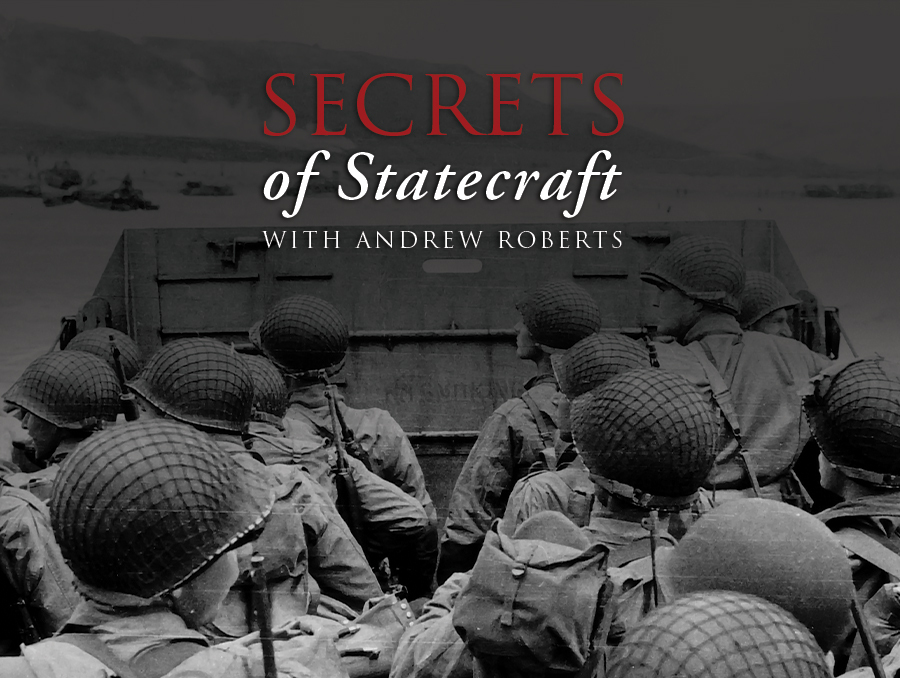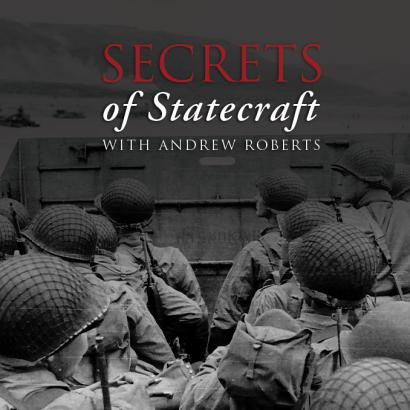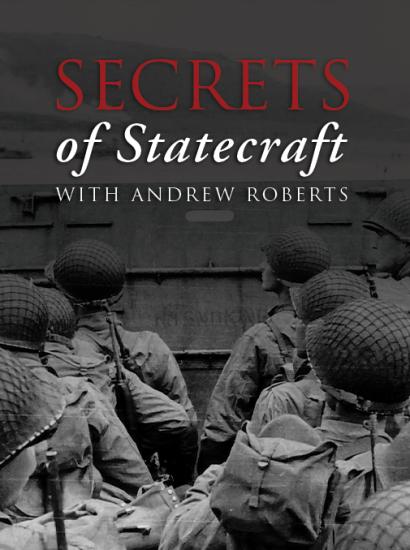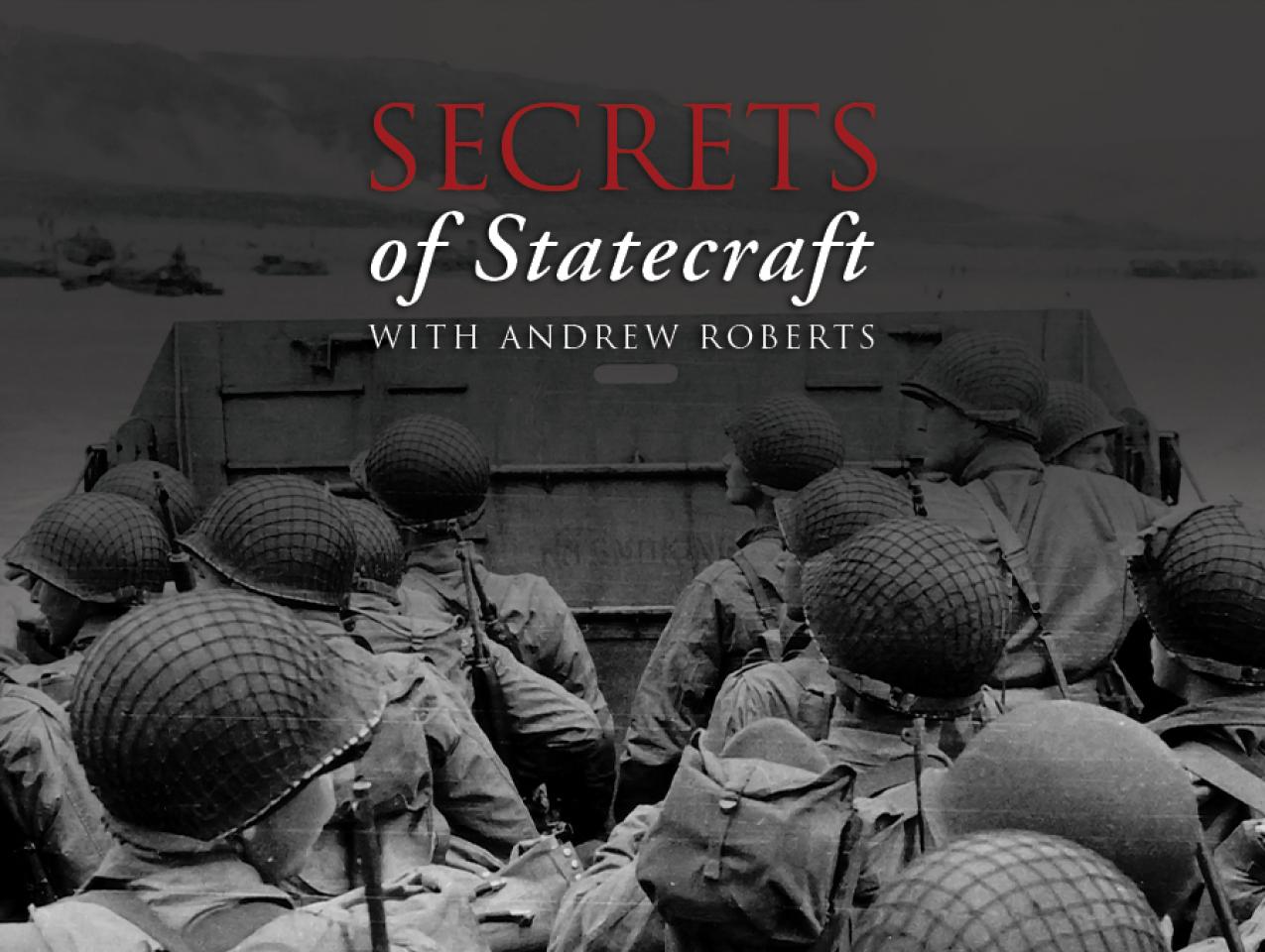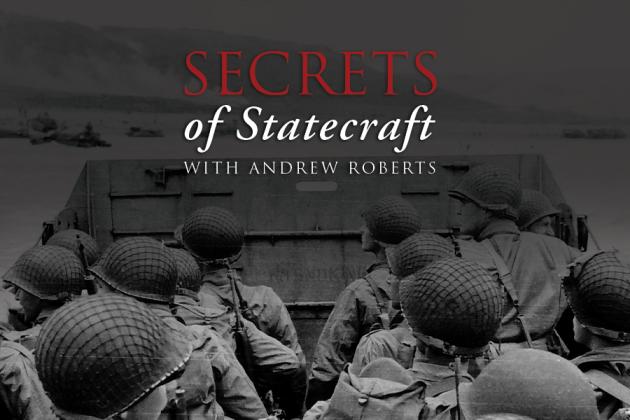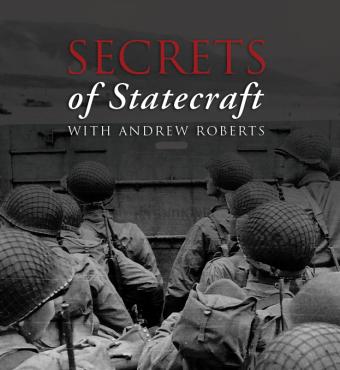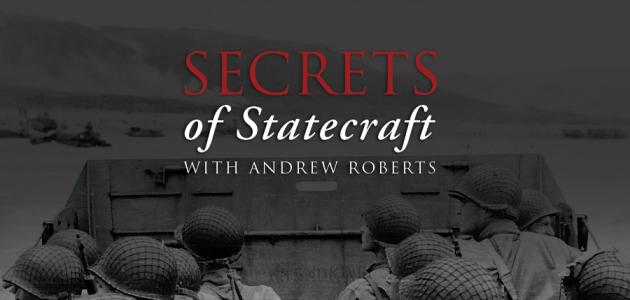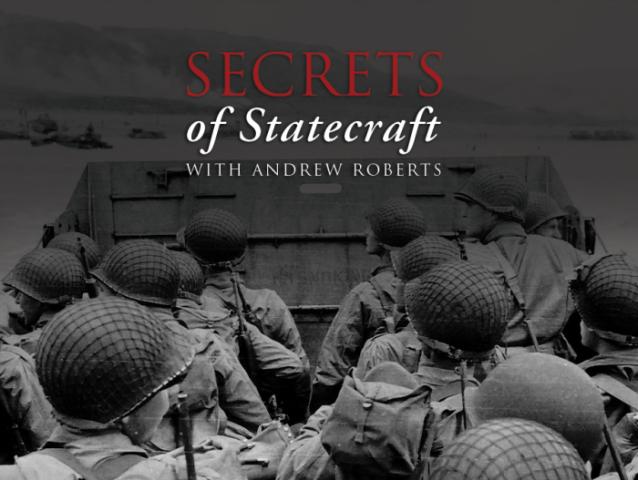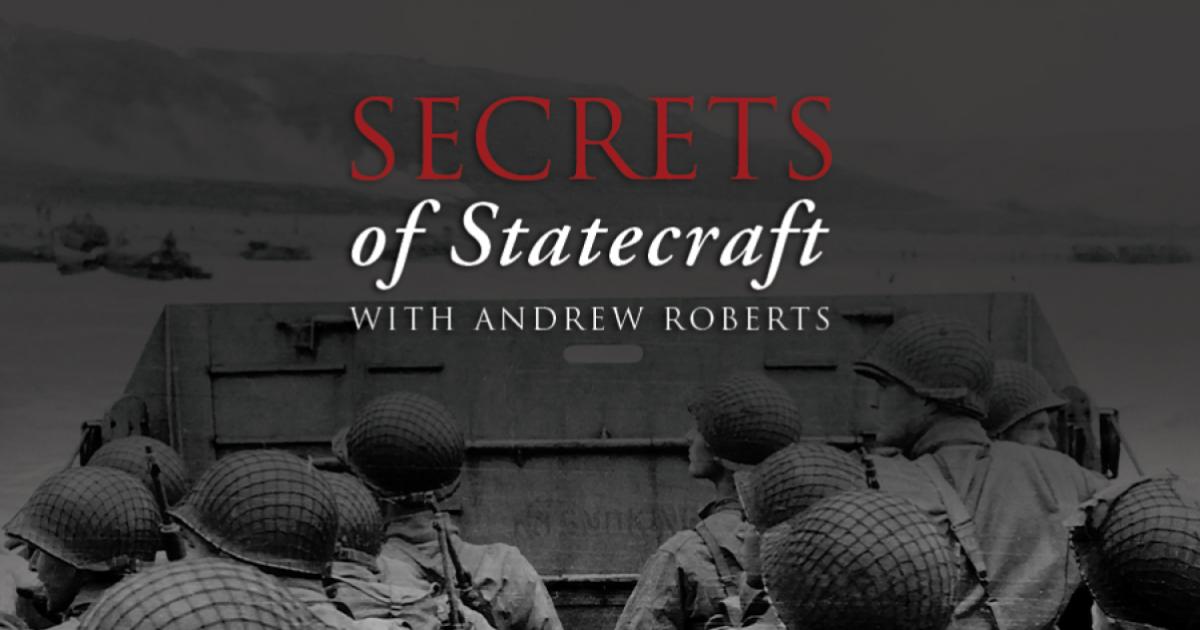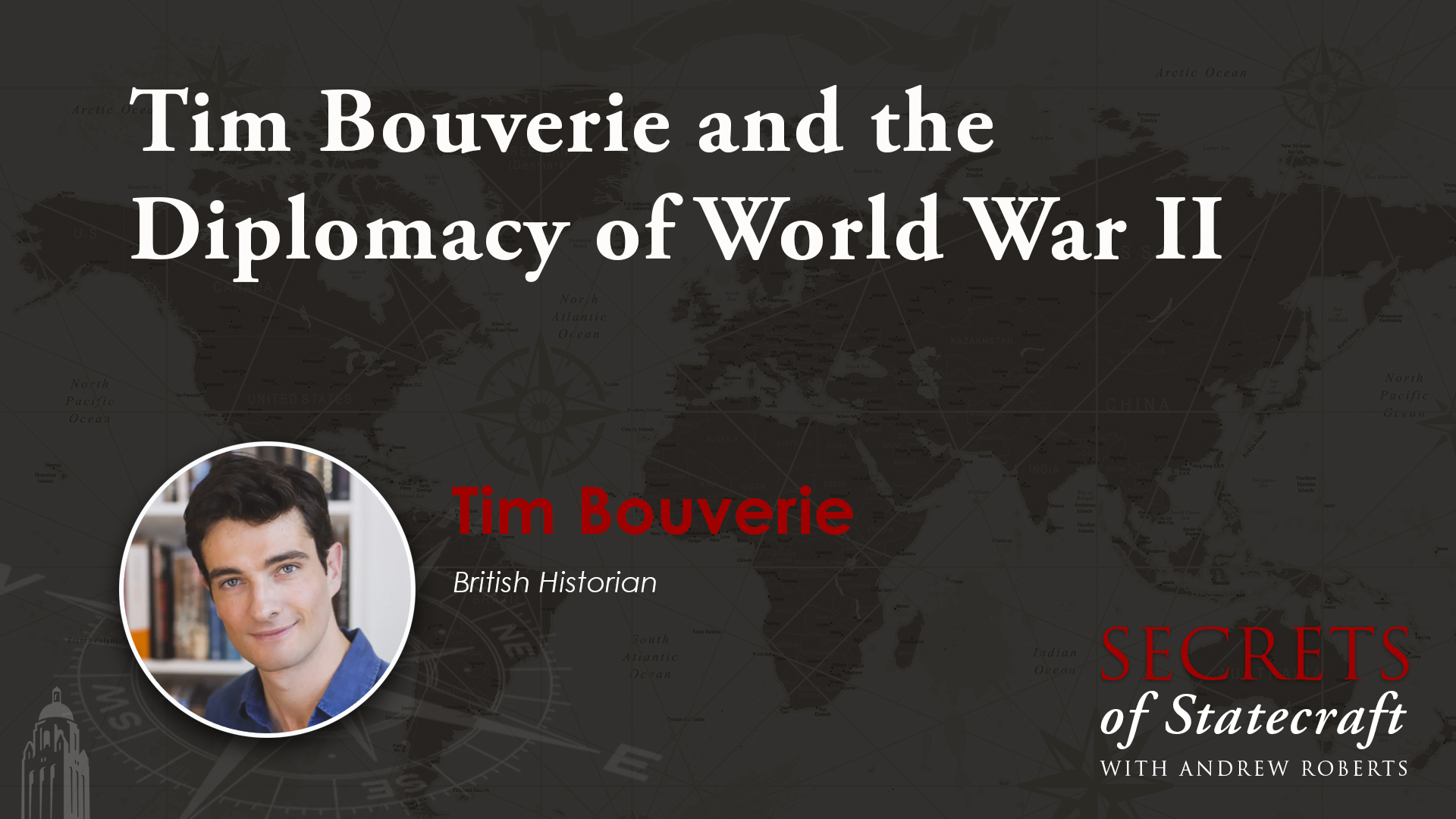- History
- Revitalizing History
British historian Tim Bouverie discusses the knotty diplomatic dilemmas faced by Churchill, Roosevelt, and Stalin.
WATCH THE VIDEO
>> Andrew Roberts: Tim Bouverie is a British historian and the author of the acclaimed new book Allies at War. Tim, you've written this, this fantastic book, Allies at War, which you subtitle the Politics of Defeating Hitler. It's a totally fascinating subject, needless to say. What prompted you to write the book?
>> Timothy Pleydell-Bouverie: Well, thank you for having me, Andrew. The book is, in many ways, I thought, a natural successor to my first book, which was Appeasing Hitler or in America, Appeasement, Chamberlain, Churchill and the Road to War. And it's a continuation because as you know as well as anyone, politics doesn't stop just because war begins.
Politics carries on. And the only real reason that Adolf Hitler and the Italians and Imperial Japan were defeated was because this highly improbable and incongruous coalition of nations and empires came together in order to defeat them. And while I think a lot of people are very aware of the military events that led to victory in 1945, and aware of some of the more romanticized elements of cooperation between the Allies, there was an awful lot of tough politics that went on at the same time that I felt could be explored.
And at the same time I wanted to try and write a book which looks beyond the scope of just the Big Three and opened up Allied politics to British relations with France before the fall of France in 1940, and the consequences of the disintegration of that alliance, as well as allied relations with important neutral countries like Spain, Ireland, Turkey, and finally that really major other ally which is so often neglected, Nationalist China.
>> Andrew Roberts: And you've very much concentrated on archival research, haven't you? You've worked on the diaries and the correspondence of the diplomats, of everybody involved, as you say, below the level of the Big Three, although they are constantly in there, too, of course. What was that like?
>> Timothy Pleydell-Bouverie: Well, I found it completely fascinating.
Not everything, as people will realize, is directly relevant in that. Often you will find diplomats complaining that the Big Three haven't taken their advice. But that in itself is, I think, really important, because knowing how the Big Three were advised, what other perceptions were of them, acting diplomatically, militarily, at conferences in Downing street, at the White House, wherever, is extremely important.
And I think one can get so overwhelmed by these men who had such great power, but their ideas didn't come out of nothing. They weren't operating in a vacuum. So trying to find the diaries of these ambassadors, diplomats, attaches, was, I thought, really important and rewarding.
>> Andrew Roberts: Of course, they were all asked not to, in fact, the British were told not to keep diaries, and yet absolutely everybody did, thank God.
As far as we historians are concerned, it was extremely lucky, wasn't it?
>> Timothy Pleydell-Bouverie: Absolutely. And they're fantastically well written, as are the dispatchers, particularly the British ones. It was a real art. A lot of these people who went into the Foreign Office were wrote extremely beautifully and very amusingly as well.
I think the idea of writing an amusing dispatch was slightly more frowned upon in the us. It's that slightly more dry and professional, the US diplomatic cables, whereas the Soviet ones are at the absolute opposite end of the spectrum. Because as you again, as you know, the Soviet diplomats were always looking over their shoulders, wondering what the NKVD operatives in their own embassy would be reporting back and trying to second guess the wishes and intentions of Stalin.
So none of them were ever going to say, well, actually, there are some legitimate reasons why the Allies don't want to open up a second front in 1942 or 1943. They're always feeding his paranoia that it's because they really do want to see the Soviet Union bled white.
>> Andrew Roberts: Yes. And you can see why they might not make jokes. The British diplomats were constantly trying to amuse each other in these dispatches with jokes. But a joke can land you in. In jail in Stalin's Russia, in fact, that's what Alexander Solzhenitsyn went to jail for. So that's, I suppose, another reason you came across a very funny interaction between Lord Halifax, the British ambassador to America, and former Foreign Secretary, and a senator, an American senator.
And I wrote a biography of Lord Halifax In, I think, 40 years ago or something, and I never found that I felt very jealous of you, very envious of you. To find Halifax trying to say something, or succeeding, in fact, in saying something funny, because I thought that he only made one joke in his entire life.
So do you mind drumroll to tell us about Lord Halifax's joke?
>> Timothy Pleydell-Bouverie: Well, I'm not sure it's going to have you rolling in the aisles, but for Halifax, as you say, not the. Funniest.
>> Andrew Roberts: The very fact it's a joke by Halifax.
>> Timothy Pleydell-Bouverie: Exactly, so Lord Halifax, as you say, Andrew, goes as British Ambassador to the United States following the death of the former ambassador, Lord Lothian, in December of 1940.
And to begin with, he gets almost everything wrong. A lot of that is his fault, but some of it's not. And this is an example where it's not. He is addressing a group of Republican isolationist congressmen who grill him for several hours on all these contentious issues, such as Britain's unpaid First World War debts, Britain's policy of appeasement in the 1930s, Britain's post war aims.
And this is just after the Soviet Union has been invaded and Churchill has welcomed Stalin as a partner in the fight against fascism. And some of these republican congressmen ask how the British can justify fighting alongside a Soviet dictator who until mere days ago had been effectively Hitler's ally.
And Halifax replies that when a man is at the bottom of a hole, he will accept the hand of a gorilla if it's his only way out. And the republican asks, and what if the gorilla turns on you when you get out of the hole? And he just said we will cross that bridge when we come to it, rather mixing his metaphors.
>> Andrew Roberts: But anyway, that's mixing, but nonetheless, the guerrilla gag, as I like to think of it, is, was certainly a new one on me when I read your book it's did the, you've just mentioned isolationist American senators. Do you think that. And of course, America first, the original America first was something that the political thoughts of lots of American senators, including Midwestern ones in the late 1930s and up until December 1941.
Do you see any modern day parallels with the modern America first movement?
>> Timothy Pleydell-Bouverie: I think there are some. I think in the sense that this is isolationism, it's not our trouble. There's a conspiracy on the part of those that are supporting the democratic side to drag America in, and that we should be as wary of our potential allies as we are of our foes.
That is certainly something. But support for the Third Reich was minimal in America, to put it at its most polite. It really was a very small section of society and certainly included nobody in government. And there was virtually nobody in the United States of America who had any doubt as to who the aggressor was in 1939, 1940 and who the victims were.
So I think the fact that there is equivocation, not least in the White House about who the aggressor is in the Russia, Ukraine war is a startling difference from otherwise some notable similarities.
>> Andrew Roberts: You describe the grand alliance between the Big Three, Churchill, Stalin and Roosevelt as quote improbable and incongruous.
What did you mean by that?
>> Timothy Pleydell-Bouverie: Improbable in the sense that when the war broke out in September of 1939, Stalin was Hitler's ally and the United States was firmly isolationist. And it is, I think, one of the great what ifs whether the US would have come into the war had it not been for Pearl Harbor.
I think maybe, but certainly not anytime particularly soon. And beyond that, one of the things which I haven't really appreciated until I began working on the book was that the Neville Chamberlain government which was in power until the beginning of the Battle of France on 10 May 1940.
Didn't even want the United States to fight alongside the Allies because they were so aware of the demands that the US Government would make at the peace conference, particularly affecting the British Empire and the system of tariffs which protect. In those days the US Government was very against tariffs and it was the British who were using tariffs to protect their empire.
Nobody anticipated the fall of France. It was, to quote another historian that you and I know and admire, Andrew David Reynolds. I think May June 1940 was the fulcrum of the 20th century. It was a completely unexpected event. The Anglo French alliance was the one that should have held the line against Nazi Germany and had held the line in the west between 1914 and 1918.
So that that is why it is improbable. And in Congress, for many of the reasons I've mentioned, an alliance not just between democratic west and communist east. But also between imperialist Britain and strongly anti-imperialist Roosevelt administration, albeit with some quite imperialist economic instincts.
>> Andrew Roberts: Britain was under pressure from the Americans with regard to empire, especially the empire in India.
Tell us about the effect that Mahatma Gandhi had on Anglo American relations and what his stance was during all of this.
>> Timothy Pleydell-Bouverie: It's very curious, the Gandhi, American British dynamic, because as you know, Andrew, Gandhi was this great anti colonial crusader and idealist. But he had what would be considered some extremely odd, if not disagreeable, views on the nature of the war and on Adolf Hitler.
Who he seems at moments right up until and including 1940 to admire in some respects, and whom he advised the British to lay down their arms for and surrender their beautiful island to. So the British obviously didn't have much sympathy with him on that score. The Americans put the British under great pressure to negotiate with the Indian National Congress, that's the main nationalist party in India, following this succession of military defeats.
Probably the greatest succession of defeats in British military history following Pearl Harbor, as the Japanese swept down through Malaysia, Burma, and reached the gates of India. And the British did go through with these negotiations. They sent Sir Stafford Cripps out and a fairly comprehensive offer was made to Congress that independence, which could include complete separation from the British Commonwealth would occur at the end of the war.
But not before then, and in the meantime that India would participate fully in the Second World War, which is something that Congress was not prepared to accept. The other great hallmark of Gandhi's campaign and that of his followers was nonviolence. And so the idea of fighting in the Second World War was anathema to them.
The British found it very hard to take American lectures though on imperialism, when as they saw it, and with a degree of justice. There was this immense racial injustice within the boundaries of the United States itself with regard to America's own black population.
>> Andrew Roberts: Tell us about something about the importance of British diplomacy in Spain.
It was vital to keep Franco Spain neutral for strategic reasons, wasn't it? How did we go about doing that considering that Franco was a fascist dictator?
>> Timothy Pleydell-Bouverie: Absolutely, well, it was a question of carrot and stick, but rather more carrot than stick to give an idea of quite how important Spain was.
Later on, at his Nuremberg trial, Hermann Goering, the Reich Marshall, told his American interrogator that in his opinion. Hitler's greatest mistake was not to follow up the fall of France with an invasion of Spain, seizing the Rock of Gibraltar, which was Britain's last continental possession, and closing the Mediterranean to the Royal Navy.
And from then the Axis would have been able to wreak even more havoc on British convoys in the Atlantic from bases in western Spain and possibly Portugal as well. In order to avoid this, the British bribed leading members of the Franco regime, generals and ministers, to stay neutral.
It's unclear how much this affected the actual outcome, although it was a huge amount of money, some 3 to 4 million pounds that was spent on this operation. But more importantly, they were prepared to sustain the Franco regime with the bare necessities of oil and grain, because Spain was completely deficient in both following the three year civil war.
Which made it clear to Franco that and these were things that the Axis could not supply to him in sufficient quantities, that if he wanted his regime to survive. If he didn't want to reopen or risk reopening the civil war, he had to keep on good terms with the British.
>> Andrew Roberts: That's a super story about Alan Hilgoth, the British spy, giving money or he's passing money over to a Spanish general in their golf bags on golf links. And they essentially, that was how there were huge numbers of gold sovereigns that were sort of left at the bottom of the golf bag.
And that's one of the ways that they bribed these generals. Tell us you've mentioned Gibraltar, and of course, there's one point in the war where the Vichy French actually bomb Gibraltar. And yet it wasn't war was never declared between them. But there was fighting that took place in Syria and, and elsewhere.
How did, and of course the, the Royal Navy sank the French fleet at Oran in the July of 1940. How did that work? How did they fight this undeclared war?
>> Timothy Pleydell-Bouverie: Well, I, I think this is completely fascinating and it's one of the few moments in the book where I go into slightly go into military history because the theme of the book is allied fighting and infighting and that includes physical fighting if it involves an ally or an erstwhile ally.
So the British, as you say, sink a proportion of the French fleet off the North African coast of Mers El Kebir harbor on the 3rd of July 1940. And, and then they try to seize Dakar, the capital of Senegal or French West Africa in September of 1940, which causes the Vichy French to bomb Gibraltar and causes many within the Vichy collaborationist regime to argue for a declaration of war against Britain.
That doesn't happen, but it is a de facto state of war. And when a revolt breaks out in May of 1941 in Iraq, from which Britain gains considerable oil reserves for its Mediterranean and North African campaigns, and which is part of the crucial land route to India from North Africa and the Middle east, the Vichy French allow the Luftwaffe to use their airfields in Syria to bomb British soldiers in Iraq.
And that is what occasions a really bad bloody two month war between the British and the Free French on the one hand and the Vichy French and supported by Axis logistics and materiel on the other. And I think it is Churchill who says that it's a pity the French didn't fight with such conviction in May, June of 1940 as they did in June, July of 1941 against the British.
>> Andrew Roberts: One of the themes that emerges from your book are these long held suspicions between the British and the Americans. Tell us about those.
>> Timothy Pleydell-Bouverie: I think that the Americans consistently thought that the British were too clever by half. They hadn't amassed this empire by luck. They hadn't amassed it by military might.
They had amassed it by being extremely clever and scheming. And behind every British suggestion, the Americans always thought that there was some ulterior motive, some scheme to enrich themselves or to gain more territory or to change the strategy of the war to favor British imperial interests and prop up the crumbling empire.
While for their part, the British thought that the Americans were naive. They thought that they were avaricious. They thought that they didn't understand the complexities of strategy or diplomacy. They were wonderfully honest and brave. They wanted to charge across the Channel at the first possible opportunity to invade France, when the British having been or had the worst of the Wehrmacht at Norway, Dunkirk, Greece, North Africa were far more cautious.
And this led to quite a lot of exasperation on both counts. But it is something that continued even up to and including the end of the war when members of the Truman administration had, in the days after Franklin Roosevelt has died, are warning the new American President not to allow the British to inveigle them into a coalition against the Soviet Union.
They think that it's the American's job to be a balancing force between the massively anti communist British and imperialist British and the Soviets on the other hand.
>> Andrew Roberts: And to what extent are those suspicions fair? I mean, we did try to ensure that the first time the Americans come up with a cross channel invasion invasion attack concept is the autumn of 1942.
The attack doesn't actually take place until 6 June 1944. So in a sense they do have a point. And don't we also have a point with regard to the Mediterranean strategy? We wanted to fight in the Mediterranean. Wasn't that in a way an attempt to keep the Suez Canal and keep the British interests in the eastern Mediterranean?
These are suspicions, as you say, that each side has of the other one. But they're not completely unfounded suspicions, are they?
>> Timothy Pleydell-Bouverie: No, by no means at all. I do however think that it is a secondary motivation. The imperial interests and the personal interests in the Mediterranean. I'm not a military historian, but I haven't come across any serious military historian who thought that a crossing of the channel in 1942, which is when the American military wanted to do it, would have succeeded.
The British and the Canadians couldn't even succeed in raiding the French port of Dieppe in 1942. So how Overlord could have exceeded in 1942 and possibly even in 1943 is I think very hard to see. But then Churchill was also wrong that the so called soft underbelly of the Axis in Italy did not exist.
Italy proved an extremely tough nut to crack. And the Allies are still slogging up the top part, admittedly of the Italian peninsula as the Allies are entering Germany, having started that operation much later.
>> Andrew Roberts: Yes, and it's going to these kind of suspicions and doubts are going to affect the relationship, the power dynamic essentially, actually between Churchill and Roosevelt.
How do they tell us a bit about that dynamic from. Well, really from the beginning, from May 1940 when Churchill becomes Prime Minister, all the way through to Roosevelt's death in the April of 1945.
>> Timothy Pleydell-Bouverie: Franklin Roosevelt and Winston Churchill shouldn't have necessarily got on because of the issue of imperialism.
And this is where they are both at their most sincere. However much Churchill loves America, and he really does, he is half American, he loves the British Empire more. And however much he admires and has an affection for Franklin Roosevelt, he's not going to be pushed around on India or any part of the British Empire.
But despite a disagreeable first meeting in either 1918 or 1919, immediately after the First World War, a meeting which Churchill then, to his embarrassment, forgot, Roosevelt is one of the first members of his administration to realise that Churchill is the best man that Britain could possibly find. In 1940.
There are all of these rumors going around Washington, rumors propagated by the US Ambassador to London, Joseph P Kennedy, father of the future President, that Churchill is not just unreliable, but drunk the whole time. And this is again, like a lot of rumors, it has a small foundation.
In truth, he's certainly imbibing more than most people would who are trying to run a war or do any sort of frontline political job. But he is not drunk all the time. And Roosevelt tells his Cabinet that Churchill is the best man that Britain can have, even if he is drunk all the time.
And we've talking Andrew, about those strategic dilemmas to give Roosevelt his credit, although he makes, I think, a great error by promising Stalin a second front in 1942, when even George Marshall, who wants it, has warned him that he can't guarantee that this is something the Allies can deliver.
Nevertheless, when it comes to a choice between the Mediterranean strategy favoured by the British or as some of the US Chiefs of Staff want to do, a reorientation towards the Pacific and a repudiation of the already agreed Germany first strategy, he sides with the British and he is under Churchill's influence to a great extent strategically, up until, I would say, the Tehran Conference of November 1943, when we then see him moving quite considerably towards the Russian point of view and taking an almost sadistic delight in humiliating his friend and partner, the British Prime Minister, in order to try and curry favour with the Communist dictator.
>> Andrew Roberts: So how would you characterise Churchill and Roosevelt's diplomacy with respect to Stalin then?
>> Timothy Pleydell-Bouverie: I don't think that either of them were at their best when dealing with Stalin. They both felt that personal contact with Stalin could yield major dividends, whereas there's not that much evidence that it ever did.
There aren't very many concessions that Stalin gives and they allow themselves to be deluded on this in a not totally dissimilar way to the way that Neville Chamberlain allowed himself to be gulled by his personal meetings with Hitler, there's a slight difference in that Churchill does suffer from really the beginning of the Anglo Soviet alliance, which precedes the Soviet American alliance by some five months, some acute moments of pessimism about the future of the war, about Stalin's willingness to cooperate, about the post war intentions of the Soviet Union.
And so he oscillates between extreme pessimism and rarely justified optimism, which whereas Roosevelt I think is even more confident that he can, and this is a quote from him, handle Stalin. He thinks he has handled him at Tehran and I think he thinks he's handling him at Yalta.
Although all the evidence goes to suggest that it's Stalin that's handling Roosevelt rather than the other way around.
>> Andrew Roberts: Well, isn't he just lying? Essentially he's making promises about the integrity and independence of Poland when he had absolutely no intention of actually allowing either of those things.
>> Timothy Pleydell-Bouverie: Yes, he's certainly lying.
He's putting his signature to meaningless declarations like the declaration on the liberation of Europe. He's squeezing every last territorial concession he can out of Roosevelt with regard to the Far east in return for a promise to enter the war against Japan. One of the things the Americans continually rail against the British for are secret agreements and spheres of influence and territorial carves up.
But what Roosevelt does at Yalta is exactly that. And without the knowledge or any sort of discussion, let alone consent, of America's most cherished ally, which I think a lot of people might be surprised to know is not the British, but the Nationalist Chinese. If every single opinion poll that is taken in America throughout the war shows that the country that Americans most sympathize with is that is part of the United Nations.
The anti-Axis coalition is Nationalist China.
>> Andrew Roberts: Which loses some 15 million people in the course of the Second World War. Which is a statistic I think, that very few people know or at least recognize properly. It was a massive loss of life, not necessarily in terms of the number of Chinese, but it's sort of half as many as the Russians lose.
And we all know about the way Russia bled in the Second World War. So tell us about China and the diplomacy that the British and the Americans as well as obviously the Russians had with Nationalist China. Why wasn't Chiang Kai Shek a more important figure? Why wasn't it the Big Four rather than the Big Three?
>> Timothy Pleydell-Bouverie: Well, Roosevelt would like it to have become the Big Four. He spoke of four post war policemen which included the Big three plus Nationalist China. And in his broad analysis of this, he was far more far sighted than Churchill. He said to Stalin at Tehran, look, I'm not claiming that Nationalist China is a great power now or that they are putting up some amazing fight against the Japanese, although as you say Andrew, they lost a huge number of their countrymen and they were responsible for pinning down some 600,000 Japanese in western China between 1940 and 1945.
600,000 Japanese that could have otherwise been sent to fight against the British in India or the Americans in the Pacific. But he said this is a country of almost half a billion people and they're going to count for something someday. And when they do, it will be far better if they are well disposed oriented towards the west, particularly the Americans.
The problem is that the US has got a faulty understanding of Nationalist China. The US believes that because China is an anti imperial power that they are a fledgling democracy with a lot in common with the democratic west. Whereas in fact the Nationalist regime was a venal incompetent autocracy.
And it's that disconnect between the reality and the image that so disappoints the Americans in the war, particularly in the figure of the American General, General Joseph Vinegar Joe Stilwell, who is sent out there to be liaison between American forces and Chinese forces, but also effectively to run the Chinese war effort on behalf of the west for Chiang Kai Shek.
And there's a huge personality clash between Stilwell and Chiang Kai Shek. And it leads to a really, really bad inter allied row, one of the very worst, in which the US threatened to cut ties with the Nationalists at one stage and put strong pressure on Chiang Kai Shek to include the Communists in his war effort.
And the idea of supplying the Communists under Mao Zedong with Lend Lease material, it's a really significant episode and one which gains political currency later in the 1950s. Question of who lost China.
>> Andrew Roberts: Mentioned earlier. About secret diplomacy and how much the Americans didn't like the idea that the British might be conducting it.
So tell us about the naughty document.
>> Timothy Pleydell-Bouverie: So the naughty document was the so called percentages agreement which Churchill worked out with Stalin in October of 1944 as the Red army is sweeping westwards, Churchill becomes more and more obsessed with the idea of trying to save as much of Eastern Europe as he can from Communism.
And the naughty document, which seems so cynical, it's a piece of paper in which he has written out the percentage influences that the British and the Soviets are going to have in certain Balkan countries with the idea that there will be 50%. Influence each between the British and the Soviets in Yugoslavia.
The Soviets will have 90% influence in Bulgaria, but Britain will have 90% influence in Greece. And it seems cavalier and cynical. The ultimate old fashioned carve up. And it gets, it's got a really bad press from historians, even historians who are quite pro Churchill. But I don't know about you Andrew, but I don't see it in that way.
I think that it's a very pragmatic realization that most of the Balkans have gone. The Red army is there or about to be there almost immediately. And Churchill's idea is that he is prepared to sacrifice what is already lost influence in some of these Balkan countries to try and save what remains.
And that is his particular focus is Greece which Britain had gone to the aid of in 1941. Long term British strategic interest. And to an extent he succeeds. When there is an attempted communist coup and the beginnings of the Greek Civil war or the first round of the Greek civil war in the winter of 1944, 1945, Stalin does nothing to help the Greek communists.
And the British are able to suppress the revolt.
>> Andrew Roberts: Absolutely. I don't think there's anything naughty about the naughty document. It saves democracy in its birthplace, Greece. There's a long standing conspiracy theory which unfortunately is getting a second wind at the moment with the likes of the extreme and ultra maga conspiracy theorists that FDR essentially sold out Eastern Europe, in particular Poland at the alta agreement that he advised by communists, secret communist advisors Al Ja his and Harry Dexter White and so on had essentially just, just folded completely and allowed the Eastern Europe to go communist.
Where are we on this? I mean first of all did you find any indication whatsoever in all of the archival work you've done to support this, in my view insane thesis and otherwise. Do you think that in fact realpolitik is to, well not necessarily to be blamed but to explain what ultimately happened as opposed to some, some theory about the venal democratic president.
>> Timothy Pleydell-Bouverie: I definitely of the rail politics school and for that reason I don't think Yalta is the most important allied conference. Most of the decisions had been made beforehand. And again part of the conspiracy theory isn't just that Roosevelt is in league with communists in his administration or Soviet spies, but that he's so ill at Yalta that he's unable to function properly.
FDR isn't on his best form at Yalta. He has only got six weeks to live. But the policy he pursues at Yalta is consistent with the policy he's been pursuing since 1942 and politics is a succession of bad choices. And he thinks that the best choice he can make is to maintain the grand alliance and that he will also be able to have more influence with Stalin and try and prevail on him to temper his ways if that alliance prevails beyond the end of hostilities.
So he's not prepared to break with the Soviet Union at that stage. I do think that it's true that unlike Churchill and Stalin, FDR and the Americans continued, and this included Eisenhower, to think about the war for far longer as their top priority even as it got into its dying days.
And one could see that in Eisenhower's almost naive but certainly chivalrous and the British exasperating refusal to go for Berlin in 1945. They continue to think that this military expediency must trump politics right up to and including the dropping of the atomic bomb. So I think that there was very little that Roosevelt could have done to save Poland and there was no direct carve up.
It wasn't Munich, it wasn't, you are allowed to take this slither of territory and we condone this. The agreement was explicitly that Poland should be free and democratic and there should be elections as soon as order was resolved. And the Declaration for liberated Europe which the Allies signed at Yalta said that all former Nazi occupied states should be free to determine their own destiny.
So these pieces of paper might have been toothless, but they weren't a capitulation in the way that the Munich Agreement could be interpreted as being.
>> Andrew Roberts: And what else could Churchill and Roosevelt have done? If you've got 2 million plus Russian troops stationed in Poland?
>> Timothy Pleydell-Bouverie: Absolutely nothing.
The thought of using force is unthinkable. Which is the name given to the military plans which Churchill asks to be drawn up in May of 1945 which would use the British and the Americans to drive the Soviets back to their so called natural frontiers. I think that by that stage of the war it's almost impossible to start from communizing Eastern Europe.
And the British and the American public had not been prepared psychologically to even oppose communist Soviet demands in this part of the world. Criticism of the Soviet Union had been suppressed in the democratic west during the war to a far greater extent than Anglo American mutual recriminations and criticism.
I do think that it is interesting though that FDR was warned about Soviet penetration of the Manhattan Project at an early stage and did nothing very much about it. And there was obviously a large amount of Soviet espionage in both Washington and Whitehall. Equally that the British and the Americans were very cavalier about continuing their private discussions at Tehran and at Yalta and in Moscow in rooms which they knew to be bugs.
I don't think this is a conspiracy. I don't think it's. Roosevelt was in any way pro Communist or had any desire to let the Soviets get the secret of the bomb or get any other element of British and American planning. In fact, he and Churchill were consistent that they were never going to tell Stalin about the bomb, but they were quite reckless in their security arrangements.
The Western leaders, I think.
>> Andrew Roberts: Tell me, what history book or biography are you reading at the moment?
>> Timothy Pleydell-Bouverie: Well, I'm rereading War and Peace. Does that count? I think Tolstoy said, it's not a novel, it's not a history book. It's an amalgam of the two. It's one of my favorite novels and I haven't read it for 15 years and I'm enjoying it the second time round, I think, even more than I did the first.
>> Andrew Roberts: Yeah. There's the extremely irritating and philosophically stupid in my view, long disquotation about. About determinist history in which he tries to argue that France would have invaded Russia even if Napoleon hadn't existed. It's the only bit of War and Peace that I don't like. Of course. The rest of it's absolutely sublime.
You're not a determinist, are you? No. Good.
>> Timothy Pleydell-Bouverie: I'm not a determinist. And Isaiah Berlin's essay the Hedgehog and the Fox is very good on that.
>> Andrew Roberts: It sums it all up, doesn't it? What about your. What if you're counterfactual?
>> Timothy Pleydell-Bouverie: There are so many. But if I was to try and pick one, I would like to know what would have happened had the French in particular, but let's say the British and the French opposed the remilitarization of the Rhineland in 1936 with force.
Would that have dented Hitler's confidence? Would it have shaken the regime? Certainly the former, maybe the latter. But above all, would it have given confidence to the democracies that Hitler and his territorial ambitions could be contained? And if that had happened in 36, would there have been a need for Munich in 38?
>> Andrew Roberts: Yes, it's a good one, isn't it? And all those German generals who later at least said that they were all planning to overthrow him in The March of 1936, if the French and British had been tough and had militarily opposed the mainland coup? Does make you wonder.
Has to be the last major step along the the Road to War. So, yeah, that's a good one. That works. Tim Bouverie, author of Allies at War, the Politics of Defeating Hitler. Thank you so much for coming on Secrets of Statecraft.
>> Timothy Pleydell-Bouverie: Thank you, Andrew. It's been a great pleasure.
>> Andrew Roberts: Thank you, Tim. On the next episode of Secrets of Statecraft, my guest will be Lord Conrad Black, the eminent Canadian businessman and historian, whose new book is the Political and Strategic History of the World, Volume 2 From the Caesars to Louis XIV.
>> Speaker 3: This podcast is a production of the Hoover Institution, where we advance ideas that define a free society and improve the human condition.
For more information about our work, or to listen to more of our podcasts or watch our videos, please visit hoover.org.







